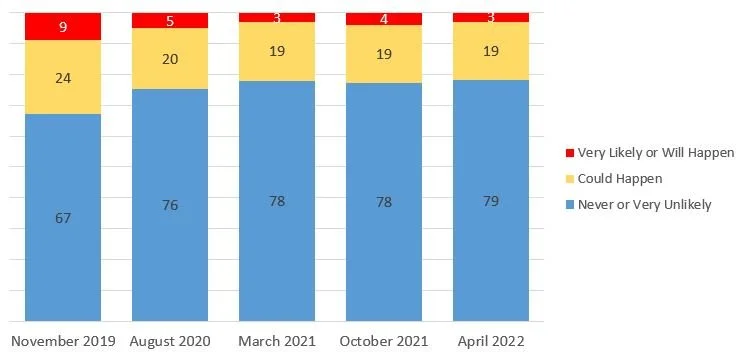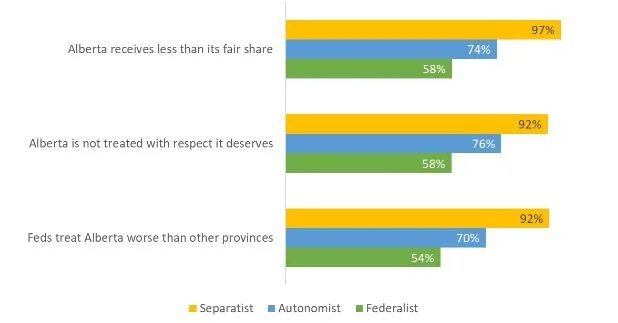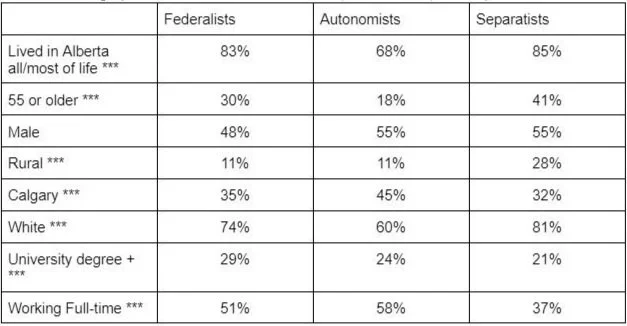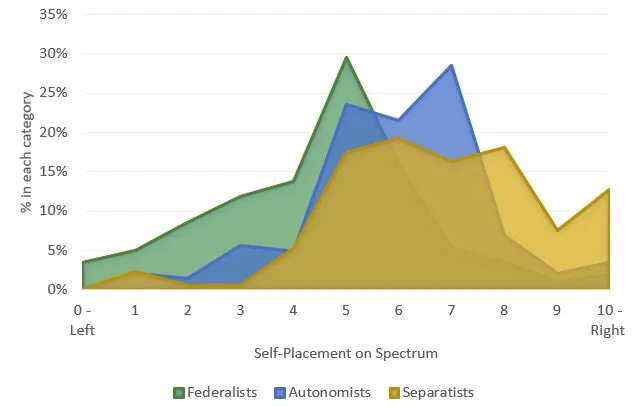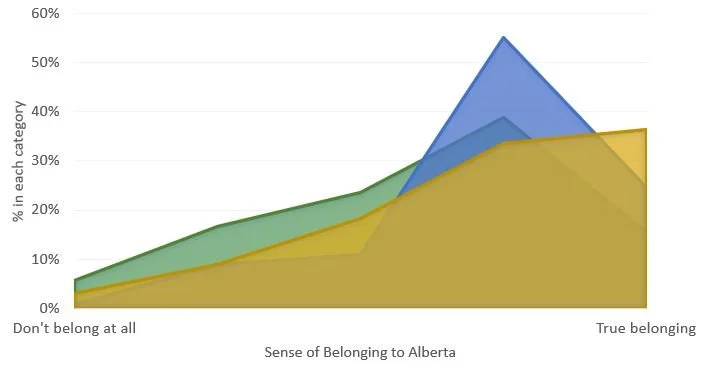Albertan Orientations Toward Confederation
Lisa Young | University of Calgary | lisa.young@ucalgary.ca
Jared Wesley | University of Alberta | jwesley@ualberta.ca
July 8, 2022
Introduction
Over the past century, Alberta has occupied a dynamic role in Canadian confederation, often challenging the status quo and advocating greater decentralization. This has been grounded in a sense of alienation from and exploitation by central Canada. Alberta’s place within Canadian confederation has been a constant, if peripheral, dimension of the province’s politics for decades. Since the 2019 federal election, calls for separation from or greater autonomy within Canada have become more prominent, generating lively political debate.
This research brief looks at support for Alberta separation, and for increased autonomy within Confederation, analyzing data from the Spring 2022 Alberta Viewpoint Study. It shows that separatists and autonomists (those wanting Alberta to exert more power over areas within its jurisdiction) together comprise about 40% of Albertans. However, our analysis shows that separatists and autonomists are distinctive groups with very different orientations toward Canada.
How Strong is Support for Separatism?
Figure 1: Support for Alberta Separation, 2019-2022
Source: Viewpoint Alberta Survey 2019 (n=820), Viewpoint Alberta Survey 2020 (n=824); Viewpoint Alberta Survey March 2021 (n=802); Viewpoint Alberta Survey October 2021 (n=877); Viewpoint Alberta Survey April 2022 (n=2151). Weighted data. Numbers represent proportions of respondents who answered “yes” to the following question: “Should Alberta separate from Canada and form an independent country?”
After the 2019 federal election, frustration that the Trudeau Liberals had been re-elected generated a wave of support for the idea of Alberta’s separation. As Figure 1 shows, this had waned by August of 2020, and has remained fairly steady since, with roughly one in five Albertans answering yes to the question “do you think Alberta should separate from Canada and form an independent country?”
Support for separatism outstripped confidence that it would come to fruition, however. We also asked respondents to what extent they “consider Alberta separatism a real possibility” (Figure 2). Exceptionally few Albertans saw separation as very likely or imminent. The proportion of Albertans feeling like separatism was never or unlikely to occur rose from two-thirds in November 2019 to nearly 4 in 5 by April 2022.
Figure 2: Albertans’ Beliefs in the Possibility of Separatism, 2019-2022
Source: Viewpoint Alberta Survey 2019 (n=820), Viewpoint Alberta Survey 2020 (n=824); Viewpoint Alberta Survey March 2021 (n=802); Viewpoint Alberta Survey October 2021 (n=1204); Viewpoint Alberta Survey April 2022 (n=877). Weighted data. Numbers represent percentages responding to the following question: “To what extent do you consider separatism to be a real possibility?”
Those who felt Alberta should form an independent country were asked about their reasons for supporting separatism (Figure 3). Economic considerations are clear drivers of separatist sentiment, with desire to exit the Canadian equalization system, to set tax policy, and to set economic policy the most common responses.
Figure 3: Reasons for Supporting Separatism, April 2022
Source: Viewpoint Alberta Survey April 2022 (n=167). Weighted data. Numbers represent percentages responding to the following question: “People support Alberta separatism for a wide range of reasons. How much do each of the following factors matter to you in terms of why you feel Alberta should leave Canada?”
Support for Greater Autonomy
While separation from Canada would be a radical departure from the status quo, several other measures are often discussed as means of increasing Alberta’s autonomy within Confederation. The survey asked respondents’ views on four of these: removing Section 36, which deals with the principle of equalization, from the Constitution Act, 1982; replacing the Canada Pension Plan with an Alberta Plan; creating an Alberta police force to replace the RCMP; and creating a new provincial tax collection agency to replace the role of the Canada Revenue Agency for provincial taxes. Survey respondents ranked their support for each of these on a scale from 0-10, which was combined into the Autonomy Index shown in Figure 4.
Those survey respondents who believe Alberta should separate generally scored high on the Autonomy Index. Most non-separatists scored 5 (neutral) or lower. This group will be referred to for the remainder of this brief as “federalists.” A smaller group of non-separatists scored above 5 on the autonomy scale. This group will be referred to as “autonomists.” Figure 5 shows the proportions of the survey respondents that fall into each category. Sixty-four percent are classified as federalists, while 17% are classified as autonomists, and 19% as separatists.
Figure 4: Support for Autonomy Measures
Source: Viewpoint Alberta Survey April 2022 (n=877). Weighted data.
Figure 5: Albertans’ Orientations Toward Confederation
Figure 6: Attitudes toward Alberta’s Treatment in Confederation
Source: Viewpoint Alberta Survey April 2022 (n=877). Weighted data. Percentages based on responses to the following questions: “In general, does the federal government treat Alberta better, worse, or about the same as other provinces?” “In your opinion, is Alberta treated with the respect it deserves in Canada?” “Thinking about all the money the federal government spends on different programs and on transfers to the provinces, Alberta receives [less than its fair share].”
The three groups - separatists, autonomists, and federalists – have varying views about how Alberta is treated within Confederation, as Figure 6 demonstrates. While there are substantial differences between the groups, even a majority of the federalists believe Alberta receives less than its fair share, isn’t treated with the respect it deserves, and is treated worse than other provinces. This demonstrates the widespread sense of alienation within the population.
Demographics
According to our research, federalists, autonomists, and separatists are quite distinct in terms of their demographic backgrounds (Table 1).
Separatists are most likely to report having lived in Alberta all or most of their lives, tend to be older, live in rural areas, are white, and are the least likely to have completed university. They are also substantially less likely to be employed full time, and more likely to report being retired (28%), working part time (16%) or being unemployed (12%).
Autonomists, in contrast, are substantially younger, more likely to be newcomers to the province, and are less likely to be white. They are more likely to live in Calgary and report the highest rate of full time employment. They are also the group most likely to report having completed trade school or some university.
Federalists are the most likely to have completed university education. They are similar to the autonomists in living in urban or suburban areas and having relatively high rates of full-time employment, and fall between the other two groups in terms of age and ethnicity. They are more similar to the separatists in their length of tenure in the province.
Table 1: Demographic Characteristics of Federalists, Autonomists, and Separatists
*** signifies statistically significant differences at p=0.001
Source: Viewpoint Alberta Survey April 2022 (n=877)
These demographic differences cast doubt on the notion that autonomists are simply separatists in waiting, or that federalists are easily converted to autonomism. The three groups are distinct, rooted in different backgrounds and experiences, suggesting that it would be more challenging to shift them into different camps.
Political Orientation
These three groups are also distinctive in political terms. As Figure 7 illustrates, when asked to place themselves on a scale from left to right, federalists tend to place themselves close to the center, while autonomists place themselves on the center-right. Almost no separatists locate themselves to the left of center, and many place themselves at the far right end of the spectrum. These findings reinforce perceptions that separatism and autonomism are closely tied to conservatism in Alberta, while support for federalism is more closely tied to centrism and progressivism.
Figure 7: Left-Right Self-Placement
Source: Viewpoint Alberta Survey April 2022 (n=877). Self-placement based on the question: “In politics, people sometimes talk of left and right. Where would you place yourself on a scale from 0 to 10, where 0 means very left-wing, and 10 means very right-wing?”
This pattern is repeated in the respondents’ identification with provincial political parties. Figure 8 shows that the majority of separatists identify with the UCP, followed by the Wildrose Independence Party (WIP). Autonomists are twice as likely to identify with the UCP than the NDP, and many identify with another party (mainly the Alberta Liberal Party). Federalists are twice as likely to identify with the NDP than with the UCP, and are the most likely not to have a party identification.
Figure 8: Federalists, Autonomists, and Separatists by Provincial Party Identification
Source: Viewpoint Alberta Survey April 2022 (n=877). Party identification based on the question: “In Alberta provincial politics, do you usually identify with one of the following parties?”
Figure 9: Provincial Party Identification by Group
Source: Viewpoint Alberta Survey April 2022 (n=877).
In federal politics, separatists’ support is almost entirely for the Conservative Party of Canada, with the further-right People’s Party coming second (Figure 10). Autonomists are most likely to support the Conservatives, but some 20% supported the Liberals and another 20% the NDP. Federalists were more evenly divided among the three major parties, with 35% supporting the Conservatives, 30% the Liberals and 25% the NDP.
Figure 10 : Federalists, Autonomists, and Separatists by Vote Choice in 2021 Federal Election
Source: Viewpoint Alberta Survey April 2022 (n=877). Vote choice based on the question: “Which party’s candidate did you vote for?”
We also find a striking difference among the groups in their evaluation of the fairness of the 2021 federal election. While the majority of federalists considered the election to have been conducted fairly, the majority of separatists believed it was unfair. The autonomist group falls in the middle on this question, with views on the issue spread across the spectrum.
Figure 11: Perceived Fairness of the 2021 Election
Sense of Attachment and Belonging
The three groups also differ in their sense of attachment to the province, the region and the country (Figure 12). A large majority in all three groups profess a sense of attachment to Alberta. There is greater variation in attachment to either Western Canada or the Prairies, wth separatists expressing the greatest attachment, and federalists the least. This reverses when asked about attachment to Canada, with federalists the most attached and separatists the least. That said, it is interesting that over one-quarter of those who believe Alberta should separate from Canada also say they are “very attached” to Canada, and another 33% say they are “somewhat” attached. This suggests a large proportion of separatists may think of independence as a strategic device, viewing their own support for separatism as a means of prompting major reforms to Confederation to make Alberta a more meaningful and respected partner within the country to which they hold a strong attachment.
Figure 12: Level of Attachment to Communities by Group
Source: Viewpoint Alberta Survey April 2022 (n=877). Attachment based on the question: “Could you tell me whether you feel very attached, somewhat attached, not very, or not at all attached to the following?” Percentages reflect responses of “somewhat attached” and “very attached.”
Similarly, Figure 13 shows that, when asked to rate their sense of belonging in the province, both autonomists and separatists are more likely to place themselves at the “true belonging” end of the scale, while federalists are more evenly divided across the spectrum.
Figure 13: Sense of Belonging in Alberta by Group
Source: Viewpoint Alberta Survey April 2022 (n=877). Sense of belonging based on the question: “On a scale from 1 to 5, where 1 means you don't feel like you belong at all, and 5 means you feel a true sense of belonging, how much do you feel like you belong in Alberta?”
We find substantial differences among the groups in their feelings about the province’s future (Figure 14). Autonomists stand out as being far more excited, optimistic, and content than either the federalists or separatists, and also less pessimistic and angry. The similarities between the federalists and sovereigntists on these measures are also noteworthy: with the exception of anger, the two groups are more similar to one another than they are to the autonomists.
Figure 14: Feelings about Alberta’s Future by Group
Source: Viewpoint Alberta Survey April 2022 (n=877). Percentages based “strongly agree” and “somewhat agree” responses to the following question: “When I think about Alberta’s future over the next ten years, I feel…”
Similarly, the three groups varied in their views of whether Alberta and Canada are headed in the right direction (Figure 15). Only 20% of federalists thought Alberta was headed in the right direction, as compared to half of autonomists and almost half of separatists. The federalists and autonomists were three times as likely as separatists to think Canada was headed in the right direction.
Figure 15 : Sense of Whether Alberta/Canada Headed in the Right Direction by Group
Source: Viewpoint Alberta Survey April 2022 (n=877). Percentages based “strongly agree” and “somewhat agree” responses to the statements above.
Conclusion
We have identified three distinctive groups of Albertans whose views of the province’s place in Confederation vary widely.
The majority of survey respondents are best classified as federalists, as they do not support actions the province might take to dramatically realign Alberta’s place in Confederation. Although they do not support action, the majority express discontent with how Alberta is treated by the federal government and other provinces, albeit at a lower rate than their autonomist and separatist counterparts. Centrist in political orientation, this group’s political affiliations are divided across major parties at both the federal and provincial level. With strong attachment to both Alberta and Canada, this group expresses pessimism and fear about the province’s future.
A distinctive group, comprising just under 20% of survey respondents, favour greater autonomy for the province within confederation. This group is younger, more ethnically diverse and more likely to be newcomers to the province than either federalists or separatists. Further to the right than federalists, the autonomists are primarily, but not exclusively, supportive of conservative parties at both levels. Strongly attached to both Canada and Alberta, the autonomists stand out as optimists, expressing excitement about the province’s future.
The separatists, who make up one in five survey respondents, tend to be older, white, and living in rural areas. Politically, they skew to the right and are virtually unanimous in their support for conservative parties. A majority believe that the most recent federal election was conducted unfairly. Separatists are strongly attached to Alberta, Western Canada and the Prairies, but less attached to Canada, which they believe is headed in the wrong direction. The separatists are less optimistic and more angry and fearful about the province’s future than the autonomists.
The wave of separatist sentiment that peaked after the 2019 election has settled at a steady 20%. Although this is a relatively small proportion of the electorate, it is one that has considerable sway within the governing United Conservative Party, amplifying its influence. The issues that animate the separatists are predominantly economic, including a desire to end Canada’s equalization system and set tax and economic policy.
In the months ahead, conservative parties at the provincial and federal levels will select new leaders. To date, conversations about Alberta’s place in Confederation have figured prominently in the UCP leadership race, with several contestants staking out autonomist positions. Our research suggests that these positions appeal to a large segment of the UCP base, but the general electorate is more federalist. While none of the leadership contenders has explicitly endorsed separatism, their discussions of ‘autonomy’ and ‘sovereignty’ suggest they would move the province in this direction. This is an unpopular opinion, with fewer than one in five Albertans supporting separatism and half that number believing that separatism is a real possibility.
Methodology
The Viewpoint Alberta Survey was conducted between April 8 and May 4, 2022. The survey was deployed online by Pollara. A copy of the survey questions can be found here: https://bit.ly/3LelxQi. Pollara co-ordinates the survey with an online panel system that targets registered panelists that meet the demographic criteria for the survey. Survey data is based on 2151 responses with a 15-minute average completion time. Split samples were employed for certain survey questions. The Viewpoint Alberta Survey was led by co-principal investigators Michelle Maroto, Feodor Snagovsky, Jared Wesley, and Lisa Young. It was funded in part by a grant from the Kule Institute for Advanced Study (KIAS) at the University of Alberta.


